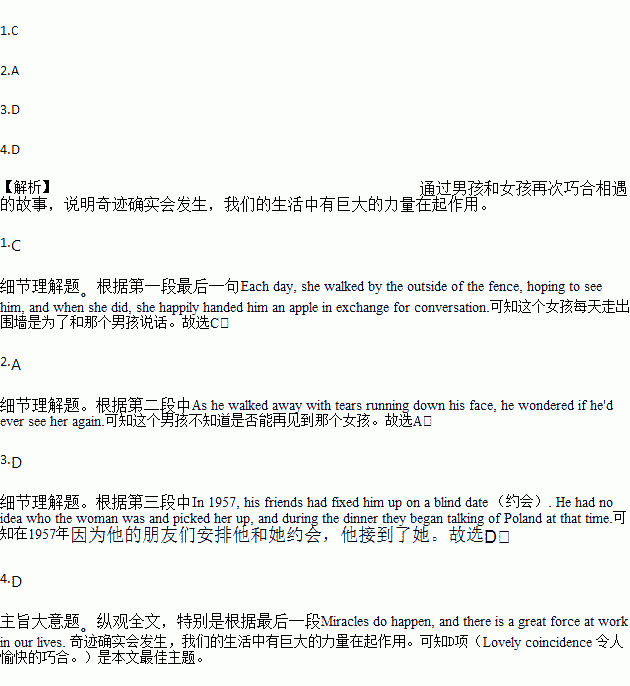题目内容
In 1945,there was a young boy of 14 in a concentration camp (集中营). He was tall, thin but had a bright smile. Every day, a young girl came by the other side of the fence. She noticed the boy and asked him if he spoke Polish, and he said yes. She then reached in her pocket and gave him her apple. He thanked her and she went on her way. The next day, she came by again, bringing with her another apple which she gave him. Each day, she walked by the outside of the fence, hoping to see him, and when she did, she happily handed him an apple in exchange for conversation.
On day he told her not to come by any more. He was being shipped to another concentration camp. As he walked away with tears running down his face, he wondered if he'd ever see her again. She was the only kind person he had seen across the fence.
He made it out of the concentration camp, and immigrated (移民)to America. In 1957, his friends had fixed him up on a blind date (约会). He had no idea who the woman was and picked her up, and during the dinner they began talking of Poland at that time. She said she used to see a boy and gave him an apple daily. He asked if this boy was tall, skinny and if he had told her that she couldn't come back because he was leaving. She said yes.
It was her, the young girl who came by every day to give him apples. After 12years, after the war and in another country, they met again. What are the odds (概率). He proposedto her on that very night and told her he'd never again let her go. They are still happily married today.
Miracles do happen, and there is a great force at work in our lives.
1.Every day the girl walked by the outside of the fence to ____________
A. See what was happening in the concentration camp
B. Ask the boy to escape from the concentration camp
C. Have a talk with the boy
D. Sell an apple to the poor boy
2.When the boy learned that he was being shipped to another concentration camp, ______
A. He didn't know whether he could meet the girl again
B. He agreed to meet the girl in the USA
C. He know he would live a happy life
D. He worried about how he could get an apple each day in future.
3.In 1957 he picked up the woman ____.
A. To thank her for what she has done in Poland
B. To find out the girl he had been willing to see
C. Because he worked as a driver
D. Because his friends had asked him to make a date with her
4.The best title for the passage would be ____.
A. Happy date B. Surprising marriage
C. A legendary (传奇)boy D. Lovely coincidence (巧合)


 itional Chinese calendar;糯米——glutinous rice;竹叶或芦苇叶——bamboo or reed leaf;自尽——commit suicide
itional Chinese calendar;糯米——glutinous rice;竹叶或芦苇叶——bamboo or reed leaf;自尽——commit suicide ite 'Roasted Turkey' with the family.
ite 'Roasted Turkey' with the family.